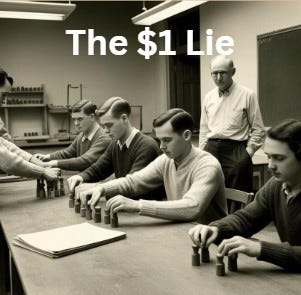The $1 Lie
How Small Rewards Reveal Big Truths
“People do not change because of what they are told, but because of what they tell themselves.”
–Unknown
The $1 Lie
Chasing Influence: Transformational Coaching to Build Champions for Life.
In 1959, a Stanford University psychology lab conducted a simple experiment that would change our understanding of human thoughts and behaviors. This study revealed something unexpected about how we balance our beliefs with our actions. The study would become an important source of insights into how to best lead and motivate others.
Researchers Leon Festinger and James Carlsmith asked college students to perform a mind-numbing task for their study. They turned wooden pegs a quarter turn, then returned them to their original position. Over and over and over again. The researchers were looking for a boring task, and they found one.
Here’s where the boring task gets interesting.
At the end of the hour, the researchers split the study participants into two groups and asked them to lie. They were asked to tell the next participant waiting outside that the task was actually fun.
The twist? One group would be paid $1 for this little white lie while the other group would receive a much more substantial $20.
Most people would assume the $20 group would be more convincing in their lies to the next participant waiting. More money, more motivation, right? Dead. Wrong.
The $1 group did something remarkable. Faced with the cognitive dissonance of having done something extremely boring for practically nothing, their brains did something fascinating. They started to believe their own lie.
Why? Because when the reward is small, your brain can't easily rationalize the experience. So instead of admitting, "I just wasted an hour for a dollar," the mind does something very clever. It shifts its perspective and convinces itself that "Maybe this task wasn't so bad after all." The $20 group, meanwhile, had a clear external justification. "I did it for the money" was a perfect mental escape hatch.
Your brain seeks harmony. When your thoughts and behaviors don’t align, this creates “cognitive dissonance.” Your brain seeks to avoid the incongruence that results when our thoughts and our behaviors don’t match, so it changes the story it tells itself to regain agreement between what we do and what we think.
This experiment reveals telling insights into human behavior. When our actions conflict with our beliefs, we often change our beliefs rather than our actions. This is the essence of cognitive dissonance. And for leaders and coaches, this offers a profound lesson in motivation and engagement. Intrinsic motivation will often trump external rewards! When people connect with the meaning behind a task, they become invested. Large incentives can actually decrease intrinsic motivation by providing an easy external excuse. It becomes about the reward, not the cause.
By guiding your team to see value in their work — even the difficult parts — you unlock a powerful form of motivation that external rewards can’t match. One way to do this is to connect to purpose. When your actions align with your core values, the “why” of your work becomes more significant than immediate outcomes. A team that knows its “why” will be far more committed to the team’s collective goals.
The stories we tell ourselves will shape our reality. What stories are you telling?
“The mind is everything. What you think you become.”
– Buddha
Connecting this quote to the story. The participants in the study reshaped their perception and ultimately became more committed to the idea that the task was enjoyable, despite their initial discomfort.
Chasing Influence tip: Help your team find personal meaning and purpose in their work, it will provide payment you can’t ever count.
If you enjoyed this story, a series of three Chasing Influence workbooks is available. Stories are accompanied by discussion questions and answers. Each workbook contains 33 lessons to use with any team.
Updates on Chasing Influence
Chasing Influence: Transformational Coaching to Build Champions for Life is available in Kindle, softcover, hardcover, and audiobook editions.
For additional resources, links to podcast appearances, and other Chasing Influence news, click here.
©Troy Urdahl, 2024


